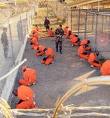Guantanamo Prisoners’ Attorney Andy P. Hart: Suicide or Murder?

On May 1, Truthout‘s Jason Leopold reported Hart’s “apparent suicide.” He represented a number of Guantanamo prisoners. More on that below.
Key questions remain unanswered. Why would a federal public defender kill himself? Where and when did he die?
Was an autopsy performed? If so, by whom? Why has no information been revealed? Why wasn’t his death immediately announced? Apparently several days passed before it was. Why the secrecy?
An alleged suicide note and thumb drive perhaps containing information on his cases remains concealed. Why?
Hart’s alleged suicide appears suspicious. It’s unclear whether he or someone else took his life. A previous article discussed Internet activist Aaron Swartz’s death. Suicide or murder was asked?
Important questions remain unanswered. He had every reason to live. His Open Access Manifesto explained best. “Information is power,” he said. It’s “a duty to share it,” he believed.
Those who’ve been “locked out” can’t stand idly by. “Sharing isn’t immoral. It’s a moral imperative. Only those blinded by greed would refuse to let a friend make a copy. Large corporations, of course, are blinded by greed.”
He believed in justifiable civil disobedience. So did earlier notable Americans. They included abolitionists, labor and civil rights activists, women’s suffrage supporters, and others from the Whiskey Rebellion to anti-war and social justice protesters.
“There is no justice in following unjust laws,” said Swartz. “We need to take stuff that’s out of copyright (and) share” it freely.
“With enough of us, around the world, we’ll not just send a strong message opposing the privatization of knowledge – we’ll make it a thing of the past. Will you join us?”
Did this sound like someone planning suicide?
Earlier alleged suicides also raised red flags. Lt. Commander William B. Pitzer worked at the National Naval Medical Center. On October 29, 1966, he died. His body was found there. Official reports said suicide.
He had photographs, color slides and film taken during John F. Kennedy’s autopsy. What’s most important to know remains secret.
Was Pitzer planning to reveal what he knew? Were authorities concerned he might do so? Did his information contradict the official story of Kennedy’s death?
Later FOIA-released documents include evidence inconsistent with suicide. Close colleagues said he wasn’t suicidal. Homicide was more likely. Perhaps he was killed to silence him.
He was shot from a distance of at least three feet. No powder burns were found. Paraffin tests were negative. They proved he had no contact with a discharged gun.
UK Ministry of Defense expert Dr. David Kelly’s alleged July 2003 suicide raised red flags. The so-called Hutton Inquiry into his death said he took his own life.
He was an insider. He accused British authorities of faking information on Iraq’s alleged WMDs. Three days after appearing before a government committee, he mysteriously died. Coverup followed.
Later evidence showed his fingerprints weren’t on the knife allegedly used to slash his wrist. Too little blood was found to suggest hemorrhaging.
No autopsy or formal inquest was conducted. Other pertinent information later learned was inconsistent with the official report. It refutes claims of suicide.
Leopold said Hart “apparently died of a self-inflicted gunshot wound.” His death followed nearly three months of mass Guantanamo hunger striking.
On March 14, he and other Guantanamo lawyers wrote Secretary of Defense Hagel. They urged him “to address the underlying causes of the strike and bring it to a prompt and acceptable end.”
They addressed the “serious threat to the health and life of” those involved. Their condition continues “to deteriorate in alarming and potentially irreparable ways.”
They requested Hagel to meet with their representative at his “earliest convenience.” They stressed resolving the crisis “fairly.” They want “the chapter on mistreatment at Guantanamo” closed.
Over seven weeks later, it continues abusively. Resolution’s nowhere in sight.
Hart was a federal employee. He was working on “sensitive legal issues.” The FBI was contacted about his death. It’s unknown if it’s investigating what happened.
“Neither the FBI nor local law enforcement officials in Toledo, Ohio returned calls for comment,” said Leopold.
Hart’s phone number is now disconnected.
“Truthout learned about the details of (his) death from an investigator who has been tapped by attorneys to work on a number of cases involving Guantanamo prisoners’ habeas corpus petitions.”
He “requested anonymity because he was not authorized to discuss the matter.”
Northern District of Ohio “top federal public defender,” Dennis Terez, “declined to comment on his colleague’s death.”
Hart’s name was “removed from the federal public defender’s website.”
Hart and fellow attorney Carlos Warner were assigned to defend Mohammed Rahim al-Afghani. He “was detained by the CIA and allegedly” tortured.
Pentagon officials claim he was bin Laden’s translator, his assistant, and “high-level” Al Qaeda figure. Hart also represented Adel Hakeemy. He’s been imprisoned for 11 years. Like many others, he’s uncharged and cleared for release.
It bears repeating. Disturbing questions about Hart’s death remain unanswered. Believe nothing at face value. Official accounts often turn out untrue. It won’t surprise if later evidence suggests or proves murder.
Stephen Lendman lives in Chicago. He can be reached at [email protected].
His new book is titled “Banker Occupation: Waging Financial War on Humanity.”
http://www.claritypress.com/LendmanII.html
Visit his blog site at sjlendman.blogspot.com.
Listen to cutting-edge discussions with distinguished guests on the Progressive Radio News Hour on the Progressive Radio Network.
It airs Fridays at 10AM US Central time and Saturdays and Sundays at noon. All programs are archived for easy listening.
http://www.progressiveradionetwork.com/the-progressive-news-hour
http://www.dailycensored.com/andy-p-hart-suicide-or-murder/

